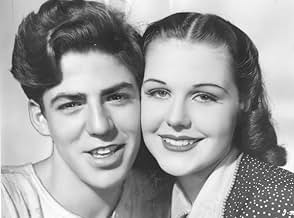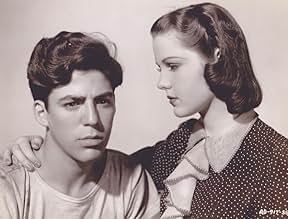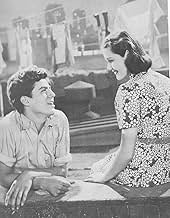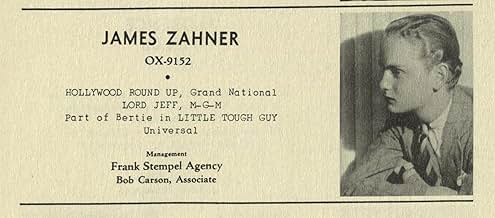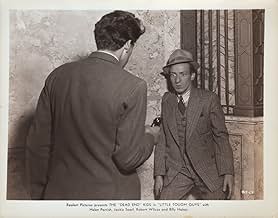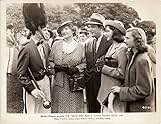After his father is sentenced to death for accidentally killing a cop, Johnny's family is left to fight for survival. His sister becomes a burlesque performer for money while Johnny joins a ... Read allAfter his father is sentenced to death for accidentally killing a cop, Johnny's family is left to fight for survival. His sister becomes a burlesque performer for money while Johnny joins a local gang and turns to a life of street crime.After his father is sentenced to death for accidentally killing a cop, Johnny's family is left to fight for survival. His sister becomes a burlesque performer for money while Johnny joins a local gang and turns to a life of street crime.
- Awards
- 2 wins total
Edward Pawley
- Jim Boylan
- (as Ed Pawley)
Hal E. Chester
- Dopey
- (as Hally Chester)
Victor Adams
- Secretary
- (uncredited)
Edward Arnold Jr.
- Fat
- (uncredited)
Hooper Atchley
- Mr. Randall
- (uncredited)
Featured reviews
This film gives great insight as to how life was for many "street" kids in NYC right after the depression and it is eerily similar to the plight of street kids in NYC today. The "dead end kids" is an awesome name. They are wanna be thugs; Violent, aggressive, uneducated, beligerent, witty and daring. One kid even wears a yankee baseball jersey with # 3 on the back just like the kids wear Derek Jeter jerseys today.)
Up until a few years ago, the lower east side was a similarly tough area, except it was inhabited by mostly people of color. Gentrification began in the 90s and has since transformed the lower east side into an affluent, yuppie filled, unaffordable place to live for the average citizen of any color in NYC.
While watching the movie, I listened to the street-slang and trouble-making behavior of the "dead end kids", and I couldn't help but saying to myself that this would be a so called "hood" film if it had been made today, like "Juice" starring Omar Epps and Tupac. Funny how the names and faces have changed, but the story is still the same.
Being from NYC myself, I felt suspended in time while watching it. My Mom was 2 and my father(may he rest in peace) was 11 in 1938.
Up until a few years ago, the lower east side was a similarly tough area, except it was inhabited by mostly people of color. Gentrification began in the 90s and has since transformed the lower east side into an affluent, yuppie filled, unaffordable place to live for the average citizen of any color in NYC.
While watching the movie, I listened to the street-slang and trouble-making behavior of the "dead end kids", and I couldn't help but saying to myself that this would be a so called "hood" film if it had been made today, like "Juice" starring Omar Epps and Tupac. Funny how the names and faces have changed, but the story is still the same.
Being from NYC myself, I felt suspended in time while watching it. My Mom was 2 and my father(may he rest in peace) was 11 in 1938.
Little Tough Guy has Billy Halop and most of the rest of the Dead End Kids operating as a gang pulling off a number of petty crimes and led by a snotty young rich kid played by Jackie Searl. Halop doesn't start out that way though.
He and the rest of his family get a real lousy break when his father Edward Pawley out of work and desperate goes to work as a scab and gets involved in a labor riot. Pawley gets blamed for the death of another worker and gets the death penalty with first degree murder.
That was part of the story I couldn't buy. Granted the family didn't have a good defense lawyer, but the circumstances in no way indicate first degree murder. Everything happens then as they're forced to move to a bad neighborhood and Halop falls in with some tough slum kids who become Searl's gang.
Not the best of films Little Tough Guy doesn't compare with what the Dead End Kids did over at Warner Brothers. This feature for Universal just doesn't have the same production values. Still it's better than what was to come at Monogram.
Marjorie Main plays Halop's mother and she's miles from the hard working Ma Kettle. Here she's a slum version of Peg Bundy.
Huntz Hall was a revelation. This will be one of the few times you see Hall play it serious and he was effective.
Not a bad urban drama though Warner Brothers did them better.
He and the rest of his family get a real lousy break when his father Edward Pawley out of work and desperate goes to work as a scab and gets involved in a labor riot. Pawley gets blamed for the death of another worker and gets the death penalty with first degree murder.
That was part of the story I couldn't buy. Granted the family didn't have a good defense lawyer, but the circumstances in no way indicate first degree murder. Everything happens then as they're forced to move to a bad neighborhood and Halop falls in with some tough slum kids who become Searl's gang.
Not the best of films Little Tough Guy doesn't compare with what the Dead End Kids did over at Warner Brothers. This feature for Universal just doesn't have the same production values. Still it's better than what was to come at Monogram.
Marjorie Main plays Halop's mother and she's miles from the hard working Ma Kettle. Here she's a slum version of Peg Bundy.
Huntz Hall was a revelation. This will be one of the few times you see Hall play it serious and he was effective.
Not a bad urban drama though Warner Brothers did them better.
Having been a fan of the Bowery Boys/East Side Kids, I eagerly grabbed this movie, expecting to see the wildly madcap misadventures of Mugs, Glimpy and the rest of the East Side Kids, boys whose misadventures stemmed from their being naughty, though not altogether bad, along with the local cops who tended to feel that the East Side Kids were a far bigger threat and who belonged behind bars. As a rule, the East Side Kids, in a race against time, with the law hot on their trails usually wound up making good and coming out the heroes in the end, by using their street smarts and their smart alack attitude. This was the general formula of the movies starring the East Side Kids. The East Side Kids were truly the kings of the B-grade movies.
With this in mind, I was at first disappointed in this movie. It was a grim and somewhat tragic story of a gang of boys stuck on the wrong side of the tracks and who, through circumstances beyond their control, wound up on the wrong side of the law, turning to crime.
Through it all, some of the character traits that would shine bright in their later movies, was apparent. There were some comic moments in this movie, though too few and far between in this movie.
In spite of my disappointment, this movie is one movie that I can watch over and over again.
A point of interest to the technical-minded viewer who loves to look for detail, the record changer in Cyril's house is a Capehart, one of the high end record changers at that time. And in the 1930s, this model cost more than the price of a new car!
With this in mind, I was at first disappointed in this movie. It was a grim and somewhat tragic story of a gang of boys stuck on the wrong side of the tracks and who, through circumstances beyond their control, wound up on the wrong side of the law, turning to crime.
Through it all, some of the character traits that would shine bright in their later movies, was apparent. There were some comic moments in this movie, though too few and far between in this movie.
In spite of my disappointment, this movie is one movie that I can watch over and over again.
A point of interest to the technical-minded viewer who loves to look for detail, the record changer in Cyril's house is a Capehart, one of the high end record changers at that time. And in the 1930s, this model cost more than the price of a new car!
This film is one of the earliest incarnations of The Dead End Kids--a group of lovable tough teens who were first introduced in the play "Dead End" and who appeared in several films for Warner Brothers AND Universal. The Warner films were more popular (as well as better) and included "Dead End" (the movie version of the play) and "Crime School". As for Universal, they hired some of these boys away from Warner for a few films and serials. Not only the composition of the Dead End Kids changed over the years but so did their name--being renamed 'The Little Toughguys' (for Universal), then The East Side Kids and ultimately The Bowery Boys. Lovers of these films will no doubt recognize Huntz Hall, Billy Halop and even David Gorcey (Leo's brother) in "Little Tough Guys" but many of the other regulars of the era are missing (Bobby Jordan and Leo Gorcey were not signed by Universal and would return later after the Little Toughguy films ended). In total, they'd make 89 films and three serials for four different studios! Confusing? A bit...but is "Little Toughguys" any good? That IS the important thing as far as this review goes.
Johnny Boyland (Billy Halop) is mad. His father was convicted of murder. The family is evicted and Johnny's sister is fired because of her father...even though she'd done nothing wrong. The family is clearly in crisis. Not surprisingly, Johnny vows to be bad and lead a life of crime. So, he assembles a gang which turns out to be financed by the teenage son of the District Attorney who convicted Johnny's father! What gives? What's really going on here?!
This is pretty typical of these earlier films featuring the boys--with a strong emphasis on crime and rehabilitation. In other words, they have a strong social conscience. Later the boys would be less criminal...more just knuckleheads! All in all, entertaining and very similar to other early films from these boys.
Johnny Boyland (Billy Halop) is mad. His father was convicted of murder. The family is evicted and Johnny's sister is fired because of her father...even though she'd done nothing wrong. The family is clearly in crisis. Not surprisingly, Johnny vows to be bad and lead a life of crime. So, he assembles a gang which turns out to be financed by the teenage son of the District Attorney who convicted Johnny's father! What gives? What's really going on here?!
This is pretty typical of these earlier films featuring the boys--with a strong emphasis on crime and rehabilitation. In other words, they have a strong social conscience. Later the boys would be less criminal...more just knuckleheads! All in all, entertaining and very similar to other early films from these boys.
LITTLE TOUGH GUY (Universal, 1938), directed by Harold Young, best known for his direction of the British adventure classic, THE SCARLET PIMPERNEL (1934), became the studio's answer and contribution to the Samuel Goldwyn social drama, DEAD END (1937). Though not as classic as DEAD END nor ANGELS WITH DIRTY FACES (Warner Brothers, 1938), thus missing tough guy leadership provided by either Humphrey Bogart or James Cagney, LITTLE TOUGH GUY contains some of the familiar plot elements along with gang members from the aforementioned dramas as Billy Halop, Huntz Hall, Gabriel Dell, and Bernard Punsley, yet missing Leo Gorcey and Bobby Jordan in the process. There's even an added attraction of Marjorie Main from DEAD END once again playing the long suffering mother, with little or no opportunity doing her forte in comedy.
Set in the tenements of New York City, the story revolves around the Boylan family: Kay (Helen Parrish), the eldest child of Jim and Mrs. Boylan (Edward Pawley and Marjorie Main), engaged to marry Paul Wilson (Robert Wilcox). She also has a younger teenage brother named Johnny (Billy Halop) who would rather be working than going to school. Johnny is admired by Rita Belle Warren (Peggy Stewart), but gives little attention to how he feels about her. As unemployed Jim Boylan attempts finding a new job at a factory where employees are striking for better wages, he's later accused and arrested for the murder of a policeman. For this, Johnny finds himself being ignored by his friends; Kay loses her job and breaks her engagement to Paul; leading to the Boylans become evicted from their apartment, having to move to another part of town. As Johnny earns money selling newspapers on street corners, he encounters gang leader "Pig" (Huntz Hall). Following a street fight in which Johnny wins, he soon develops a lasting friendship with Pig and his gang, String (Gabriel Dell), Sniper (David Gorcey) and Dopey (Hally Chester). After his father is found guilty and executed, Johnny and his new friends join forces in forming a crime wave on their own, even taking in Cyril Gerrard (Jackie Searl), a bored rich kid out for adventure, and getting deeper in trouble along the way. Featuring Helen MacKeller, Olin Howland, Charles Trowbridge and Robert Homans in smaller roles.
What makes LITTLE TOUGH GUY most interesting, especially for anyone familiar with the much latter and better known works of Leo Gorcey and Huntz Hall in the long-running "Bowery Boys" series for Monogram (1946-1958) is the presence of Huntz Hall. Better known for playing goofy characters from that series, he's believably good playing a tough gang leader. Though the first half of the plot development revolves around Billy Halop and other characters (Robert Wilcox and Helen Parrish), the second half builds up considerably involving the teenage crime wave.
Interestingly, Universal produced what developed into "The Little Tough Guys" series (1938-1943), but aside from the 85 minute LITTLE TOUGH GUY playing as part of a 45-minute featurette in public television's "Matinee at the Bijou" in the 1980s, and becoming available on both video cassette and DVD, the subsequent films that followed, with Halop playing different character roles in some, never became as famous as Monogram's most televised "East Side Kids" and "The Bowery Boys." LITTLE TOUGH GUY does not go without interest and should be considered for viewing at least once. (**1/2)
Set in the tenements of New York City, the story revolves around the Boylan family: Kay (Helen Parrish), the eldest child of Jim and Mrs. Boylan (Edward Pawley and Marjorie Main), engaged to marry Paul Wilson (Robert Wilcox). She also has a younger teenage brother named Johnny (Billy Halop) who would rather be working than going to school. Johnny is admired by Rita Belle Warren (Peggy Stewart), but gives little attention to how he feels about her. As unemployed Jim Boylan attempts finding a new job at a factory where employees are striking for better wages, he's later accused and arrested for the murder of a policeman. For this, Johnny finds himself being ignored by his friends; Kay loses her job and breaks her engagement to Paul; leading to the Boylans become evicted from their apartment, having to move to another part of town. As Johnny earns money selling newspapers on street corners, he encounters gang leader "Pig" (Huntz Hall). Following a street fight in which Johnny wins, he soon develops a lasting friendship with Pig and his gang, String (Gabriel Dell), Sniper (David Gorcey) and Dopey (Hally Chester). After his father is found guilty and executed, Johnny and his new friends join forces in forming a crime wave on their own, even taking in Cyril Gerrard (Jackie Searl), a bored rich kid out for adventure, and getting deeper in trouble along the way. Featuring Helen MacKeller, Olin Howland, Charles Trowbridge and Robert Homans in smaller roles.
What makes LITTLE TOUGH GUY most interesting, especially for anyone familiar with the much latter and better known works of Leo Gorcey and Huntz Hall in the long-running "Bowery Boys" series for Monogram (1946-1958) is the presence of Huntz Hall. Better known for playing goofy characters from that series, he's believably good playing a tough gang leader. Though the first half of the plot development revolves around Billy Halop and other characters (Robert Wilcox and Helen Parrish), the second half builds up considerably involving the teenage crime wave.
Interestingly, Universal produced what developed into "The Little Tough Guys" series (1938-1943), but aside from the 85 minute LITTLE TOUGH GUY playing as part of a 45-minute featurette in public television's "Matinee at the Bijou" in the 1980s, and becoming available on both video cassette and DVD, the subsequent films that followed, with Halop playing different character roles in some, never became as famous as Monogram's most televised "East Side Kids" and "The Bowery Boys." LITTLE TOUGH GUY does not go without interest and should be considered for viewing at least once. (**1/2)
Did you know
- ConnectionsFeatured in Film Breaks: The Dead End Kids (1999)
Details
- Runtime1 hour 26 minutes
- Color
- Aspect ratio
- 1.37 : 1
Contribute to this page
Suggest an edit or add missing content


